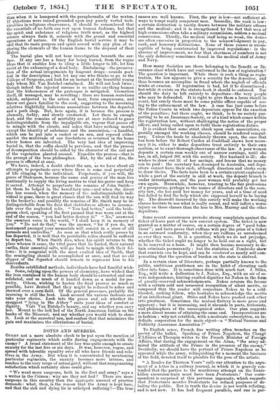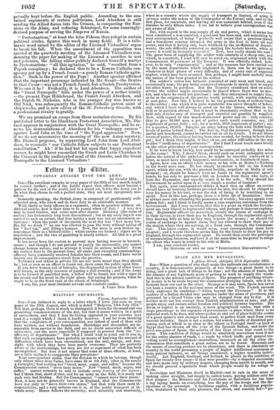NOTES AND QUERIES.
Omar not a more absolute check to be put upon the mention of particular regiments which suffer during engagements with the enemy? A broad statement of the loss was quite enough to create anxiety for the last five or six days. It was, however, vague, and spread with tolerable equality over all who have friends and rela- tives in the Army. But when it is concentrated by mentioning particular regiments, the anxiety becomes more intense, and reaches to the very verge of actual grief, without that compensating satisfaction which certainty alone could give.
" We want more surgeons, both in the fleet and army," says a a writer in the Crimea: why are they not had ? There are more surgeons in this country than the aggregate amount of practice demands : what, then, is the reason that the Army is kept bare, and that the sick and dying lie in unhelped suffering ?—The true causes are well known. First, the pay is low—.not sufficient al- ways to tempt really competent men. Secondly, the rank is low: a certain distinction is tacitly drawn between the military officers and the medical ; and it is strengthened by the fact that men of high connexions often take a military oommission, seldom a medical commission. Thirdly, the medical staff being so weak, the duties are often excessive in proportion to the acknowledgment in pay, rank, and honorary distinctions. None of these causes is unsus- ceptible of being counteracted by improved regulations : in the absence of improvement, we fear that shortness of numbers is not the only deficiency sometimes found in the medical staff of Army and Navy.
How many Societies are there belonging to the Benefit or In- surance class which have not conformed to the law of registration ? The question is important. While there is such a thing as regis- tration, the law appears to give a security for the depositor, and thus becomes an accomplice in fraud where the neglect of officials winks at evasion. If registration is bad, let it be discontinued ; but while it exists on the statute-book it should be enforced. Nor should the duty be left entirely to depositorstbe very people who may be defrauded. It is right to give them a locus standi in court, but surely there must be some public officer capable of see- ing to the enforcement of the law. A ease has just come before the Police Courts in which two depositors appear for the exaction of the penalties; but there ought, we think, to be no society pur- porting to be an Insurance Society, or of a kind which comes within the registration law, without challenging the notice of the proper officer, and being called upon to fulfil these registration duties.
It is evident that some strict check upon such associations, es- pecially amongst the working classes, should be rendered compul- sory. Unless the trade be absolutely thrown open, the case that has been before Sir Robert Carden at Guildhall shows how neces- sary it is, either to make depositors trust entirely to their own caution, or to exact thorough observance of the law. A poor woman deposits a certain sum weekly out of narrow earnings, until she has, in all, lodged 30/. with the society. Her husband is ill ; she wishes to draw out W. of her savings, and learns that no money can be paid : the secretary has decamped to Australia, and depo- sitors cannot have their cash, although directors and clerks seem to draw theirs. The facts have been to a certain extent explained : while a part of the society is still at work, the deposit branch is under investigation, and the poor woman will probably get her own again. Meanwhile, however, trusting to the fair professions of a prospectus, perhaps to the names of directors and to the secu- rity-law, she has paid her money for years, and at a time of need has failed to find the help which she supposed herself to be laying by. The discredit incurred by this society will make the working classes hesitate to use what is really sound, and will inflict a worse injury on those classes than the loss to Mrs. Murray and the other depositors.
Some recent occurrences provoke strong complaints against the ticket-of-leave part of the new convict system. The ticket is now granted as a matter of course, on a certain degree of "good beha- viour"; and facts prove that ruffians will pay the price of a ticket in an outward conformity, when they are ruffians as unredeemed as ever they were. It is a question, which we do not prejudge, whether the ticket ought no longer to be held out as a right, but to be reserved as a boon. It might then become necessary to de- tain criminals permanently ; but the statistics of Pembroke show that convicts can be kept, and can be rendered so nearly self-com- pensating that the question of burden on the state is shelved.
In a certain class of literature, perhaps partially known to the public, ambitious gentlemen are in the habit of elevating each other into fame. It is sometimes done with much tact. J. Stiles, Esq., will write a dedication to Y. Nokes, Esq., with an air of se- vere independence, hinting exalted dignities for Nokes in the form of greatly-reserved acknowledgments. Nokes returns the favour with a certain cold and measured recognition of silent merits, so composed that the reader will conjecture Nokes to be a cold- blooded, carking fellow, who hesitates to acknowledge the merits of an intellectual giant. Stiles and Nokes have pushed each other into greatness. Sometimes the mutual flattery is more gross and apparent ; but it is increasing, and it abounds in poets, fictionists, and philosophers of the unrecognized order. Our plan suggests a more direct means of attaining the same end. Incorporations are in fashion ; why not establish, with a moderate subscription, an in- definite corporation for the main object—a "Mutual Success and Publicity Assurance Association ?"
To English sense, French fine writing often `trenches on the poetry of the ballet. Speaking of Prince Napoleon, the Charge d'Affaires at Therapia writes to the French Minister of Foreign Affairs, that during the engagement on the Alma, "the army ad- mired the attitude of the Prince in the presence of the enemy." Decidedly, we should have the portrait of Prince Napoleon as he appeared while the army, relinquishing for a moment the business of the field, devoted itself to plaudits for the pose of the artiste.
" A Reader for Thirteen Years " calls our attention to the argu- ment of a letter in a railway journal, in which it is gravely con- tended that the parties to the murderous attempt on the Ennis- killen excursion-train must have been Protestants! Our corre- spondent is surprised at this perverse ingenuity, which suggests that Protestants murder Protestants for refined purposes of de- luding the public. But in truth the device is not worth refuting, and is not new. It has had frequent. parallels, and one is spar-
petually kept before the English public. According to the sus- tained arguments of certain politicians, Lord Aberdeen is still sending the Allied forces into the Crimea, is conquering the Rus- sians on the Alma, and reducing Sebastopol, for some cunningly- devised purpose of serving the Emperor of Russia.
" Protestantism," at least the false Fidessa thus yclept in certain political circles, figures this week in many fields. It is a talis- manic word raised by the editor of the Licensed Victuallers' organ to break his fall. When the amendment of the opposition was carried at the quarterly meeting of the Licensed Victuallers con- demning the paper for making of the Licensed a sacrifice to sect and polemics, the falling editor publicly declared himself a martyr to Protestantism : " all this agitation," he said, " resulted from a Popish conspiracy ; he declared this to be a Roman Catholic con- spiracy got up by a French Jesuit—a purely Roman Catholic agita- tion." Such is the power of the Pope! Another speaker affirmed that the important personage indicated by Mr. Grant—the Brutus to that Cmsar—was not a French Jesuit, but a Scotch Presbyterian. Who can it be? Evidently, it is Lord Aberdeen. The author of the " Great Necropolis " falls under the power of a nether trinity —the present Pope Hildebrand, the French Jesuit Aberdeen, and the Popish St. Nicholas, who in his younger day was known as Old Nick, was subsequently the Roman-Catholic patron saint of shipwrecks, and is now editor of the St. Petersburg Gazette, with a professional rivalry to gratify.
We are promised an escape from these sectarian storms. By his published letter to the Blackburn Protestant Association, Mr. Dis- raeli appears in conjunction with the Great Necropolis ; and he re- news his denunciations of Aberdeen for his " unhappy success " against Lord John at the time of " the Papal aggression." Now, if we do not misconceive the meaning of the new Asian mystery, Mr. Disraeli proposes, by separating Lord John from Lord Aber- deen, to reconcile " our Catholic fellow subjects to our Protestant constitution." Ah ! if he had but hit upon that happy expedient sooner, he might have reconciled the Greek and Latin Churches to the Crescent in the undisturbed mud of the Danube, and the Great Necropolis to the Licensed Victuallers !



































 Previous page
Previous page